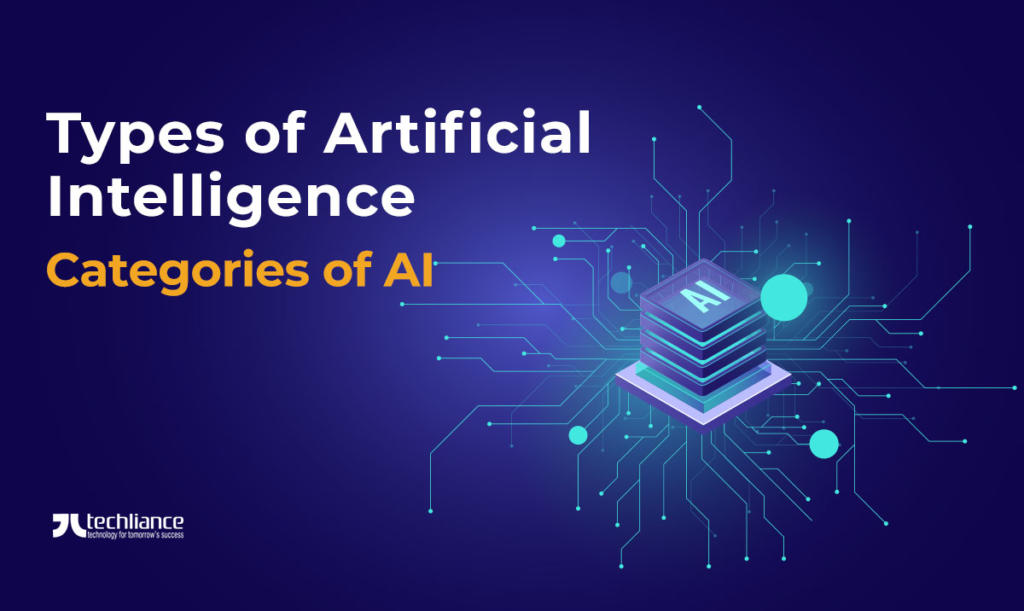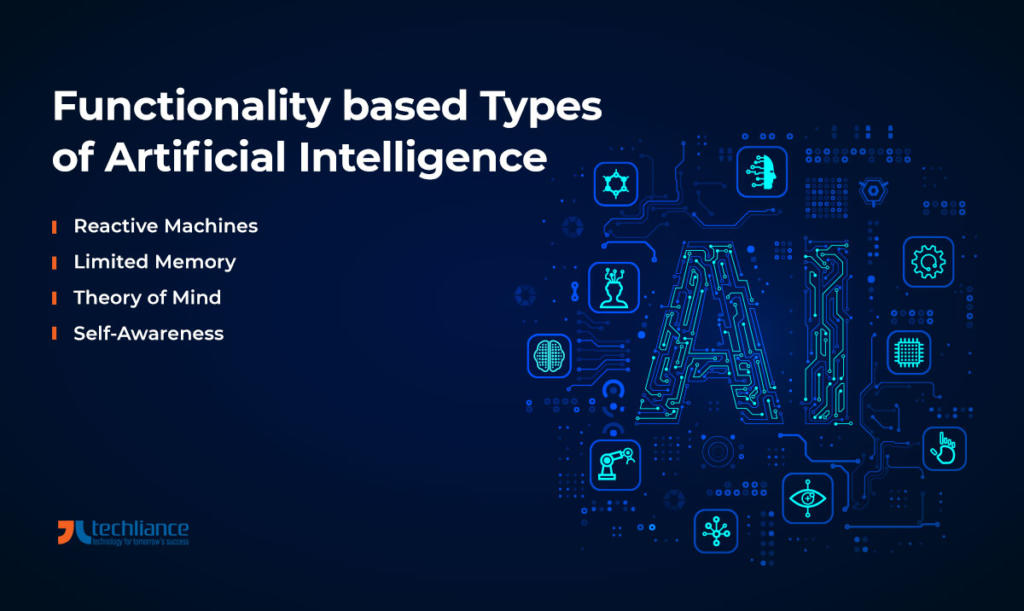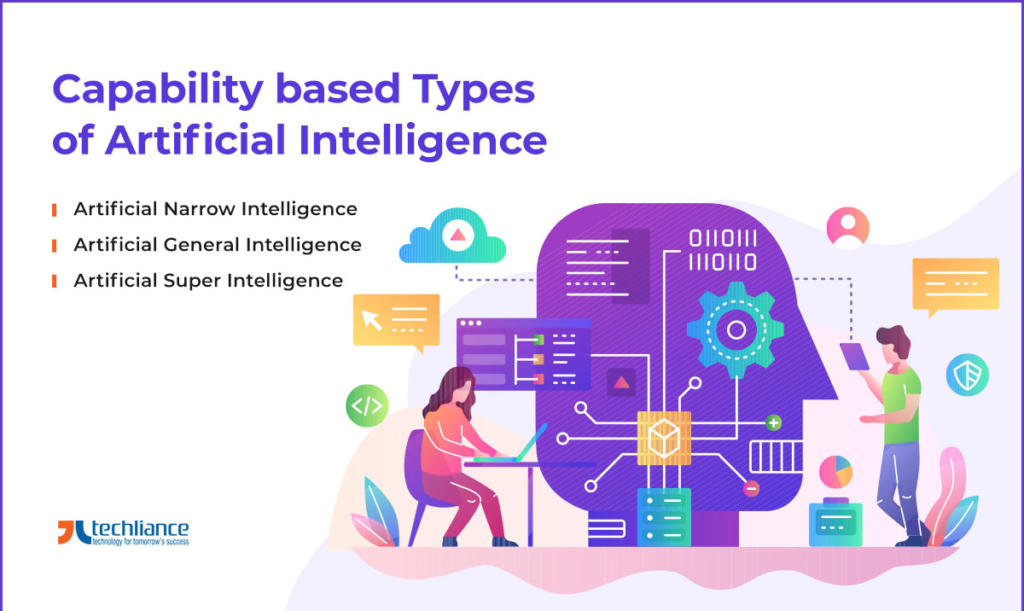With constant innovation, the world is continuously changing. Thanks to technology, we are on a high-end spectrum of mind-blowing devices, services and products that surprise us. Artificial Intelligence plays a pivotal role in shaping our lives for the better. In our previous posts, we have already discussed what AI means and its impact in 2020 and beyond. Now we will elaborate the different types of Artificial Intelligence to further break down this phenomenon and implication in our lives.
In the beginning, there is always an expression of awe which is later substituted by accepting and then embracing the new “thing” which ultimately becomes a norm. Our smart phones are the biggest evidence of our acceptance to the revolutionizing technology that has taken us over in all context of the word. AI embedded Software Development solutions help businesses in working intelligently and serving users better.

Functionality based Types of Artificial Intelligence
As the name suggests, the primary objective of such AI built systems is to perform some specific function. These are further classified into following sub-categories of Artificial Intelligence.
- Reactive Machines
- Limited Memory
- Theory of Mind
- Self-Awareness
Let’s explore the types of artificial intelligence classified according to functionality in detail.
Reactive Machines
Probably one of the oldest categories, this AI has no memory power of its own so they really can’t work on using previous data for better decision-making capabilities. They replicate a human’s ability to react to different types of stimuli. So, in a layman’s term they are reactionary to any kind of action that is performed in front of them. And on basis of that, they are able to produce a reaction.
Remember the time when computer beat Garry Kasparov in chess? That was the ultimate battle off between man vs machines which was won by IBM’s Deep Blue in late 1990s. That is the type of Artificial Intelligence which is reactive with no memory of its own.
However, it could identify all the pieces on the chessboard and how each piece moved. It was able to defeat the intelligent human. So, it was still a basic AI system which was still able to surpass ultimate human on their best day without breaking a sweat.
Limited Memory
These are the machines with some form of memory capabilities but to a limited extent. Hence, the name, i.e., limited memory. With such AI devices, you are able to conclude decisions based on past data that is used for better informed decisions for the future.
The biggest example of such models exists in Car modeling software and AI-built GPS systems. These are able to provide useful information to users for avoiding traffic jams, taking best possible routes and even minimizing risks of possible accidents.

Theory of Mind
These are the type of robots that are able to use their common sense in interpreting data and coming up with decisions in real-time. A lot of research is being done to develop machines to build an innate common sense that allows them to not just analyze data but also assess it for their greater gain.
For now, the closest possible robots are able to interpret stairs and other robots coming from opposite direction. On basis of interpreting obstacles, the robot is able to come up with a safe downward passage.
Self-Awareness
Remember those life-like bots and androids in movies? In simple words, this is the type of AI used for creating such type of technology. Self-awareness AI is able to even interpret human emotions and base decisions that are not just logical but also influenced by feelings.
Sounds scary but exciting right? However, we are a long way from this technology coming to us in any time soon. Currently this is a far fledged idea that is constantly being expanded and worked upon in Research labs around the world.
Capability based Types of Artificial Intelligence
As the named suggests, when we are classifying AI in this category it is all about finding one solid ground of skills or competency for the AI-based machines. Capability oriented AI types are also based on the functionality types that have been elaborated.
So, basically you design an AI system and implement it on a functionality. This helps in creating a particular capability or attribute that it is known for. These are the capability focused AI types.
- Artificial Narrow Intelligence
- Artificial General Intelligence
- Artificial Super Intelligence

Let’s take a look at capability-based categories of Artificial Intelligence in depth now.
Artificial Narrow Intelligence (ANI)
Take a look around you and you will notice that majority of current AI systems fall under artificial narrow intelligence category. These are the devices that are able to perform a very narrowly specific task.
You may want them to perform any unprecedented task that they were not programmed to perform. Then they will miserably fail at this because they do not have the capacity to improvise or grow along. In a way, these AI-built systems under Narrow AI are more or less based on reactive machines or limited memory AI models as well.
If you are put off by Weak AI, then you will be surprised that the most complex predictive modeling is also performed through it. Take the example of algorithms used by the search engines. So, despite having its limitation, it is still very extensive with great usage in today’s world.
A lot of Software development services are focused on providing ANI systems to devices and machines. Therefore, the scope for ANI remains widely open for further grooming and elaboration.
Artificial General Intelligence (AGI)
Now this is some cool stuff as it trains, learns, understands and performs functions like a normal human being. Artificial general intelligence systems have multi-functional capabilities. The future of AGI systems is to allow flexibility with more breadth for being agile and reactive.
General AI comes handy in unpredictable situations especially, where the system has no prior experience of dealing with. So, the system will form a reaction based on some previous data from vaguely similar situations and then act out.
However, because of the unpredictability of machines; we need to have proper research before any advancements are made that can cause disruption to human lives.
Artificial Super Intelligence (ASI)
As the name suggests, artificial super intelligence is supposed to be the coolest and smartest AI. It is not just supposed to outsmart us all but also to be first in processing and making decisions that are even better in rationality in comparison to humans.
One of the downsides to such technology like Super AI would be it causes an uncontrollable change that forever reshapes our human civilization. Maybe, that change is positive but there is also the risk of it causing a valuable loss to our lives as well.

Conclusion
We cannot deny the power of Artificial Intelligence and its existence in our lives. We are also using AI whether it is by using a map app on phone, or running an online search, or just by participating in huge collection of data for a super computer.
At day-end, we are all equal participants in continuously shaping our life for the better. However, the question that remains is how useful this technology will be for the greater good. Will there come a time when we would ever regret allowing to surpass humans in every way possible?
Are you looking for an AI-built Software system? Then contact Techliance for creating a leading-edge solution for your business.
Types of Artificial Intelligence FAQs
Artificial Intelligence (AI) is the branch of computer sciences that emphasizes the development of intelligent machines and systems, thinking and working like humans. Examples of AI include speech recognition, problem-solving, learning, and planning, etc.
Artificial intelligence is classified by many norms. Two of the main categorizations of AI are capability and functionality. AI has three types on the criteria of capability: Artificial Narrow Intelligence (Narrow AI), Artificial General Intelligence (General AI), and Artificial Super Intelligence (Super AI). There are four types of AI on the basis of functionality: Reactive Machines, Limited Memory, Theory of Mind, and Self-awareness.
AI powers many programs and services that help us do everyday things such as connecting with friends, using an email program, or using a ride-share service. If you have reservations about the use of artificial intelligence, it may be comforting to know that most of us have been using AI on a daily basis for many years.




